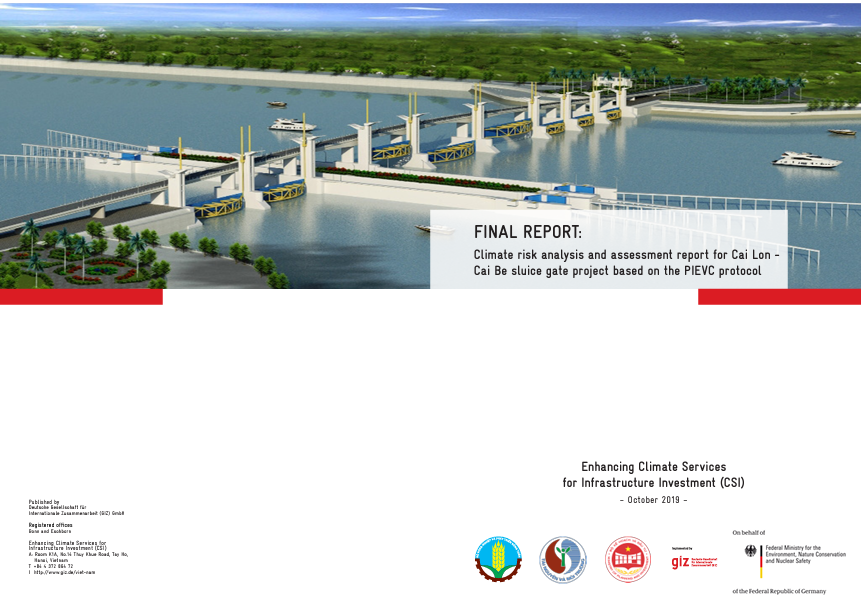Final Report: Climate Risk Analysis and Assessment Report for Cai Lon – Cai Be Sluice Gate Project Based on the PIEVC Protocol

Summary
This resource was submitted by the Climate Risk Institute for use by the CanAdapt Climate Change Adaptation Community of Practice.
This article is an abridged version of the original text, which can be downloaded from the right-hand column. Please access the original text for more detail, research purposes, full references, or to quote text.
Background
T his report presents the results of the climate risk assessment conducted for the Cai Lon – Cai Be Sluice Gate project in the Mekong Delta, Vietnam, between August 2018 and May 2019. The assessment was conducted using the Public Infrastructure Engineering Vulnerability Committee (PIEVC) engineering protocol for infrastructure vulnerability assessments (the “Protocol”). The PIEVC is a step-by-step methodology developed by Engineers Canada for climate vulnerability assessments for infrastructure (www.pievc.ca). The observations, conclusions and recommendations derived from the application of the Protocol provide a framework to support effective decision-making about infrastructure design, operation, maintenance, planning and development as part of climate risk management. The study has considered the potential impacts of existing and future climate conditions and hydrological factors and their potential influences on project engineering and operations.
The assessment was conducted in the context of the global project “Enhancing Climate Services for Infrastructure Investment (CSI)”. CSI is implemented by the Deutsche Gesellschaft für Internationale Zusammenarbeit (GIZ) GmbH on behalf of the German Federal Ministry for the Environment, Nature Conservation and Nuclear Safety (BMU) in the context of the International Climate Initiative (IKI, www.international-climate-initiative. com/en/). CSI supports its partners in making their infrastructure more resilient towards climate change via climate-risk-informed infrastructure planning and management using climate services. More on CSI can be found on the IKI webpage.
The Cai Lon – Cai Be Sluice Gate Project
The Cai Lon – Cai Be Sluice Gate project (the “Project”; presently in its first phase – the basic design stage) is situated in Vietnam’s Mekong Delta (MKD), where significant climate change impacts are anticipated. Due to the areas vulnerability and its importance for water allocation and regulation for the Ca Mau Peninsula in the future, it was determined that the project should be carefully studied before construction.
The Cai Lon – Cai Be Sluice Gate project has multiple infrastructure features including land transportation (roads and bridge), water navigation (sluices and ship locks), water resources (sluice gates), recreation (parks), buildings, power and so on. T he Project is considered to be representative of other infrastructures in the MKD generally and in the project area particularly. To limit the scope of the climate risk assessment, this being the first implemented by the Vietnamese assessment team, the focus of the assessment was limited to the Cai Lon and Cai Be sluice gates.
The Assessment Team
T he assessment team consisted of a multidisciplinary group of experts from engineering, climate science and water resources planning. T he Vietnamese team consisted of representatives of the Ministry of Agriculture and Rural Development (MARD) and the associated Water Resources Investment and Construction Board 10 (PMU-10) and the Southern Institute for Water Resources Planning (SIWRP) as well as of the Southern Regional Hydrometeorological Center (SRHMC). A team of Canadian Experts of Engineers Canada, Wood PLC and Risk Sciences International (RSI) guided the team from Vietnam in the assessment.
Suggested Citation:
Climate risk analysis and assessment report for Cai Lon – Cai Be sluice gate project based on the PIEVC protocol. (2019). Deutsche Gesellschaft für and Internationale Zusammenarbeit (GIZ).https://climate-resilient-infrastructure.com/wp-content/uploads/2019_GIZ_CSI_VN_PIEVC_Final_Report_EN.pdf
(0) Comments
There is no content